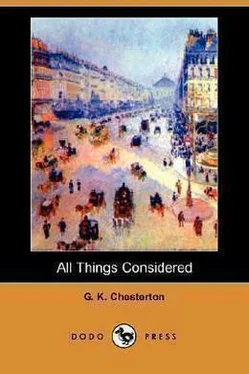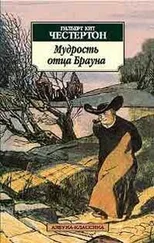There is a third thing to which the mystagogues have recently been applying the methods of a secret society: I mean manners. Men who sought to rebuke rudeness used to represent manners as reasonable and ordinary; now they seek to represent them as private and peculiar. Instead of saying to a man who blocks up a street or the fireplace, "You ought to know better than that," the moderns say, "You, of course, don't know better than that."
I have just been reading an amusing book by Lady Grove called "The Social Fetich," which is a positive riot of this new specialism and mystification. It is due to Lady Grove to say that she has some of the freer and more honourable qualities of the old Whig aristocracy, as well as their wonderful worldliness and their strange faith in the passing fashion of our politics. For instance, she speaks of Jingo Imperialism with a healthy English contempt; and she perceives stray and striking truths, and records them justly—as, for instance, the greater democracy of the Southern and Catholic countries of Europe. But in her dealings with social formulæ here in England she is, it must frankly be said, a common mystagogue. She does not, like a decent demagogue, wish to make people understand; she wishes to make them painfully conscious of not understanding. Her favourite method is to terrify people from doing things that are quite harmless by telling them that if they do they are the kind of people who would do other things, equally harmless. If you ask after somebody's mother (or whatever it is), you are the kind of person who would have a pillow–case, or would not have a pillow–case. I forget which it is; and so, I dare say, does she. If you assume the ordinary dignity of a decent citizen and say that you don't see the harm of having a mother or a pillow–case, she would say that of course you wouldn't. This is what I call being a mystagogue. It is more vulgar than being a demagogue; because it is much easier.
The primary point I meant to emphasise is that this sort of aristocracy is essentially a new sort. All the old despots were demagogues; at least, they were demagogues whenever they were really trying to please or impress the demos. If they poured out beer for their vassals it was because both they and their vassals had a taste for beer. If (in some slightly different mood) they poured melted lead on their vassals, it was because both they and their vassals had a strong distaste for melted lead. But they did not make any mystery about either of the two substances. They did not say, "You don't like melted lead?…. Ah! no, of course, you wouldn't; you are probably the kind of person who would prefer beer…. It is no good asking you even to imagine the curious undercurrent of psychological pleasure felt by a refined person under the seeming shock of melted lead." Even tyrants when they tried to be popular, tried to give the people pleasure; they did not try to overawe the people by giving them something which they ought to regard as pleasure. It was the same with the popular presentment of aristocracy. Aristocrats tried to impress humanity by the exhibition of qualities which humanity admires, such as courage, gaiety, or even mere splendour. The aristocracy might have more possession in these things, but the democracy had quite equal delight in them. It was much more sensible to offer yourself for admiration because you had drunk three bottles of port at a sitting, than to offer yourself for admiration (as Lady Grove does) because you think it right to say "port wine" while other people think it right to say "port." Whether Lady Grove's preference for port wine (I mean for the phrase port wine) is a piece of mere nonsense I do not know; but at least it is a very good example of the futility of such tests in the matter even of mere breeding. "Port wine" may happen to be the phrase used in certain good families; but numberless aristocrats say "port," and all barmaids say "port wine." The whole thing is rather more trivial than collecting tram–tickets; and I will not pursue Lady Grove's further distinctions. I pass over the interesting theory that I ought to say to Jones (even apparently if he is my dearest friend), "How is Mrs. Jones?" instead of "How is your wife?" and I pass over an impassioned declamation about bedspreads (I think) which has failed to fire my blood.
The truth of the matter is really quite simple. An aristocracy is a secret society; and this is especially so when, as in the modern world, it is practically a plutocracy. The one idea of a secret society is to change the password. Lady Grove falls naturally into a pure perversity because she feels subconsciously that the people of England can be more effectively kept at a distance by a perpetual torrent of new tests than by the persistence of a few old ones. She knows that in the educated "middle class" there is an idea that it is vulgar to say port wine; therefore she reverses the idea—she says that the man who would say "port" is a man who would say, "How is your wife?" She says it because she knows both these remarks to be quite obvious and reasonable.
The only thing to be done or said in reply, I suppose, would be to apply the same principle of bold mystification on our own part. I do not see why I should not write a book called "Etiquette in Fleet Street," and terrify every one else out of that thoroughfare by mysterious allusions to the mistakes that they generally make. I might say: "This is the kind of man who would wear a green tie when he went into a tobacconist's," or "You don't see anything wrong in drinking a Benedictine on Thursday?…. No, of course you wouldn't." I might asseverate with passionate disgust and disdain: "The man who is capable of writing sonnets as well as triolets is capable of climbing an omnibus while holding an umbrella." It seems a simple method; if ever I should master it perhaps I may govern England.
The "Eatanswill Gazette."
The other day some one presented me with a paper called the Eatanswill Gazette . I need hardly say that I could not have been more startled if I had seen a coach coming down the road with old Mr. Tony Weller on the box. But, indeed, the case is much more extraordinary than that would be. Old Mr. Weller was a good man, a specially and seriously good man, a proud father, a very patient husband, a sane moralist, and a reliable ally. One could not be so very much surprised if somebody pretended to be Tony Weller. But the Eatanswill Gazette is definitely depicted in "Pickwick" as a dirty and unscrupulous rag, soaked with slander and nonsense. It was really interesting to find a modern paper proud to take its name. The case cannot be compared to anything so simple as a resurrection of one of the "Pickwick" characters; yet a very good parallel could easily be found. It is almost exactly as if a firm of solicitors were to open their offices to–morrow under the name of Dodson and Fogg.
It was at once apparent, of course, that the thing was a joke. But what was not apparent, what only grew upon the mind with gradual wonder and terror, was the fact that it had its serious side. The paper is published in the well–known town of Sudbury, in Suffolk. And it seems that there is a standing quarrel between Sudbury and the county town of Ipswich as to which was the town described by Dickens in his celebrated sketch of an election. Each town proclaims with passion that it was Eatanswill. If each town proclaimed with passion that it was not Eatanswill, I might be able to understand it. Eatanswill, according to Dickens, was a town alive with loathsome corruption, hypocritical in all its public utterances, and venal in all its votes. Yet, two highly respectable towns compete for the honour of having been this particular cesspool, just as ten cities fought to be the birthplace of Homer. They claim to be its original as keenly as if they were claiming to be the original of More's "Utopia" or Morris's "Earthly Paradise." They grow seriously heated over the matter. The men of Ipswich say warmly, "It must have been our town; for Dickens says it was corrupt, and a more corrupt town than our town you couldn't have met in a month." The men of Sudbury reply with rising passion, "Permit us to tell you, gentlemen, that our town was quite as corrupt as your town any day of the week. Our town was a common nuisance; and we defy our enemies to question it." "Perhaps you will tell us," sneer the citizens of Ipswich, "that your politics were ever as thoroughly filthy as―" "As filthy as anything," answer the Sudbury men, undauntedly. "Nothing in politics could be filthier. Dickens must have noticed how disgusting we were." "And could he have failed to notice," the others reason indignantly, "how disgusting we were? You could smell us a mile off. You Sudbury fellows may think yourselves very fine, but let me tell you that, compared to our city, Sudbury was an honest place." And so the controversy goes on. It seems to me to be a new and odd kind of controversy.
Читать дальше








